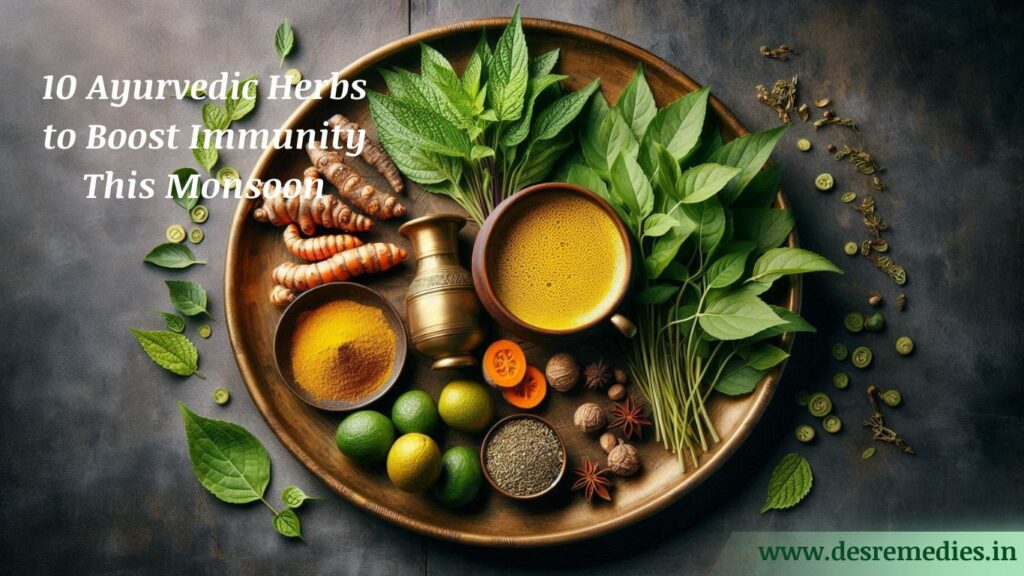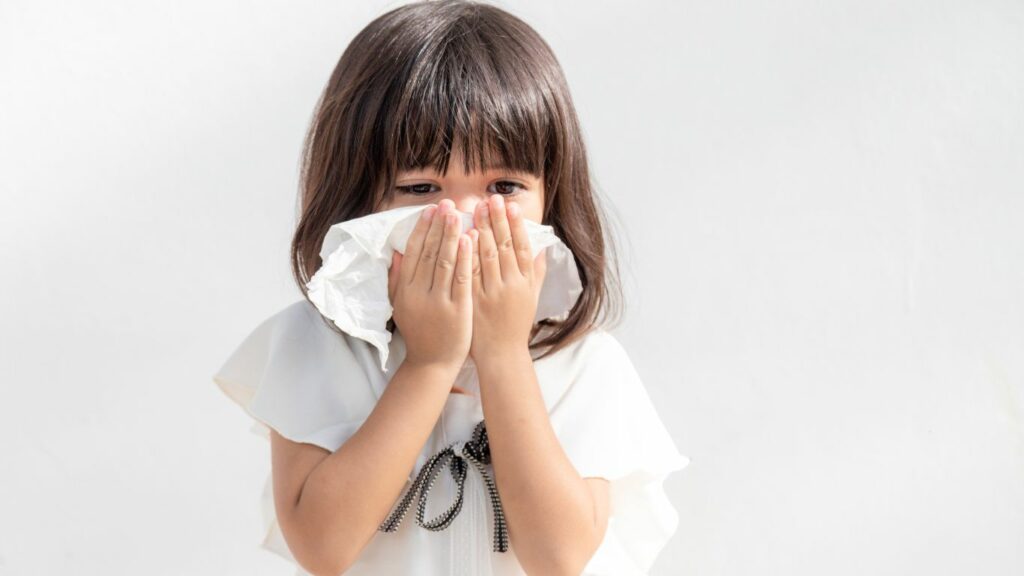
Monsoon is a time of beauty and bloom—but also of bugs, bacteria, and viruses. The sudden drop in temperature, humidity, and waterborne pathogens lead to seasonal flu, cold, cough, throat infections, stomach disorders, and skin problems. And if you’re a mom, you know how often kids fall sick during this season.
Instead of turning immediately to antibiotics or syrups, let’s look at Ayurvedic herbs for monsoon infections that have been protecting Indian families for generations.
These natural remedies are safe, effective, and holistic. They don’t just treat the illness—they boost your body’s natural defense system from within.
Why Ayurvedic Herbs Are Essential During Monsoon
According to Ayurveda, monsoon aggravates Vata and Pitta doshas and weakens Agni (digestive fire). This leads to:
- Poor digestion
- Weakened immunity
- Water retention
- Inflammation
- Fatigue and fogginess
In this fragile state, your body is more prone to viral and bacterial infections. Ayurvedic herbs help by:
- Strengthening digestion and immunity
- Balancing doshas
- Removing toxins (Ama)
- Providing antimicrobial, antiviral protection naturally
Let’s explore the top 10 Ayurvedic herbs for monsoon infections, perfect for the whole family.
1. Tulsi (Holy Basil) – The Monsoon Protector
Tulsi is a sacred herb in every Indian household, known for its antiviral, antifungal, and antibacterial properties. It boosts immunity and clears the respiratory tract.
Benefits:
- Fights cold, cough, sore throat
- Relieves respiratory congestion
- Strengthens lungs
How to Use:
- Tulsi tea with ginger and honey
- Tulsi juice (few drops in warm water)
Why it works: Tulsi is a must-have Ayurvedic herb for monsoon infections—especially useful for kids.
2. Giloy (Guduchi) – The Immunity Enhancer
Known as “Amrita” in Ayurveda, Giloy is the ultimate immune-boosting herb. It’s widely used to treat fever, viral infections, and low energy.
Benefits:
- Fights recurrent fever
- Controls inflammation
- Supports liver and gut health
How to Use:
- Giloy stem juice daily on empty stomach
- Giloy-Amla juice combo for children (consult Ayurvedic doctor)
Giloy is one of the best Ayurvedic herbs to prevent infections during monsoon—a true shield for your family.
3. Ashwagandha – The Strength Builder
Monsoon can leave you feeling lethargic and anxious. Ashwagandha restores strength, reduces stress, and supports immunity.
Benefits:
- Reduces stress and anxiety
- Enhances stamina
- Supports adrenal health
How to Use:
- Mix Ashwagandha powder with warm milk before bed
- Capsules/tablets available too
Ashwagandha is a holistic natural remedy for monsoon infections and ideal for recovery after illness.
4. Turmeric (Haldi) – The Golden Healer
A powerhouse of curcumin, turmeric has been used to treat wounds, infections, and respiratory issues for centuries.
Benefits:
- Anti-inflammatory and antiviral
- Fights sore throat, cold, skin infections
- Heals from within
How to Use:
- Golden milk (haldi doodh) at night
- Gargle with turmeric water for throat pain
Turmeric is a readily available herbal medicine for rainy season in every Indian kitchen.
Also read: How to Train Yourself to Wake Up at Brahma Muhurta: A Beginner’s Guide
5. Neem – Nature’s Antibiotic
With powerful antifungal, antibacterial, and blood-purifying properties, neem is vital for monsoon skincare and gut health.
Benefits:
- Prevents skin rashes, acne, itching
- Detoxifies liver and intestines
- Boosts immunity
How to Use:
- Neem water early morning
- Apply neem paste for skin infections
If you or your child faces skin issues in humid weather, neem is the go-to anti-infective herb.
6. Amla (Indian Gooseberry) – Vitamin C Powerhouse
Packed with natural Vitamin C, Amla boosts immunity, enhances digestion, and improves skin texture.
Benefits:
- Builds resistance to flu and cold
- Improves iron absorption
- Enhances skin glow
How to Use:
- Raw amla, amla juice or candy
- Amla murabba in kids’ diet
Amla is among the most trusted Ayurvedic herbs for monsoon infections in both kids and adults.
7. Mulethi (Licorice Root) – Throat Soother
If your family often struggles with throat infections, Mulethi is your best friend.
Benefits:
- Soothes sore throat
- Reduces cough
- Helps in bronchial congestion
How to Use:
- Boil with water and sip like tea
- Use in steam inhalation
Safe and effective, Mulethi is a mom-favorite in monsoon home remedies for kids.

Special Note for Moms: If your child is struggling with frequent cold, cough, or low immunity during monsoon, check out this blog on natural home remedies for cold and cough in kids on Momyhood. It’s full of mom-tested, child-safe Ayurvedic solutions.
8. Haritaki (Harad) – The Gut Healer
Monsoon causes bloating, constipation, and poor digestion. Haritaki helps restore balance in the gut.
Benefits:
- Relieves acidity and gas
- Supports liver detox
- Boosts appetite
How to Use:
- Take Haritaki powder at night with warm water
- Use Triphala (Haritaki + Amla + Bibhitaki) for holistic care
Ideal for those suffering from rainy season digestion issues.
9. Brahmi – Brain and Mood Balancer
The gloomy monsoon weather often causes dullness, brain fog, and low energy levels. Brahmi, one of the most effective Ayurvedic herbs for monsoon infections, helps calm the mind, boost focus, and improve mental clarity—making it especially useful during the rainy season.
Benefits:
- Sharpens memory
- Reduces anxiety
- Improves mood
How to Use:
- Brahmi syrup for kids (consult doctor)
- Powder in warm milk or capsule form
A great herb for both moms and kids during monsoon breaks or exam pressure.
10. Kalonji (Black Seeds) – The Tiny Warrior
Used in Unani and Ayurvedic medicine, Kalonji boosts energy, fights infections, and improves metabolism.
Benefits:
- Boosts respiratory immunity
- Fights seasonal allergies
- Supports skin and hair health
How to Use:
- Mix 1 tsp Kalonji oil with honey
- Use in your daily food
Kalonji is a lesser-known but potent Ayurvedic herb for monsoon infections, especially for older adults.
FAQs
1. Which Ayurvedic herbs are best for preventing monsoon infections in children?
Some of the best Ayurvedic herbs for monsoon infections in children include Tulsi, Giloy (in diluted form), Amla, and Mulethi. These herbs help in boosting immunity, preventing cold and cough, and keeping the digestive system strong. Always consult an Ayurvedic doctor for age-appropriate dosage.
2. Can I use Ayurvedic herbs during monsoon without consulting a doctor?
While most Ayurvedic herbs for monsoon infections are safe for general use, it’s best to consult an expert, especially for children, pregnant women, or those with chronic conditions. Herbs like Ashwagandha, Giloy, and Neem can interact with medications if taken in high doses.
3. How do Ayurvedic herbs help fight monsoon-related cold and cough?
Ayurvedic herbs for monsoon infections work by strengthening the respiratory system, reducing inflammation, and clearing toxins. Tulsi, Mulethi, and Turmeric are especially effective for cold, cough, and throat infections common during the rainy season.
4. How long should I take Ayurvedic herbs to see results during the monsoon?
Most Ayurvedic herbs for monsoon infections start working within a few days if taken consistently. However, Ayurveda focuses on long-term immunity, so herbs like Amla, Ashwagandha, and Brahmi may be taken throughout the season for best results.
5. Are Ayurvedic herbs better than modern medicine for monsoon infections?
Ayurvedic herbs for monsoon infections offer a holistic, preventive approach with fewer side effects. They build long-term immunity instead of just treating symptoms. However, in case of severe infection, modern medicine may be required alongside Ayurvedic support.
Final Words: Let Ayurveda Be Your First Line of Defense
As moms, we want nothing more than a healthy, happy home—especially during unpredictable seasons like the monsoon. Instead of reacting to illness, let’s prepare the body to prevent it. These Ayurvedic herbs for monsoon infections are gentle, time-tested, and deeply nourishing.
Whether it’s a cough in your child, a viral in your spouse, or dullness in yourself—nature has already given us what we need.
Stay dry, stay warm, and stay Ayurvedic this monsoon.
Disclaimer
This blog is for informational purposes only. Always consult a certified Ayurvedic doctor or healthcare professional before starting any herbal remedy, especially for children, pregnant women, or individuals with pre-existing health conditions. Dosages and suitability may vary from person to person.



